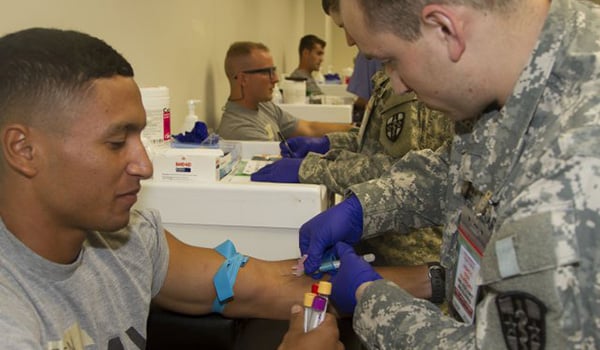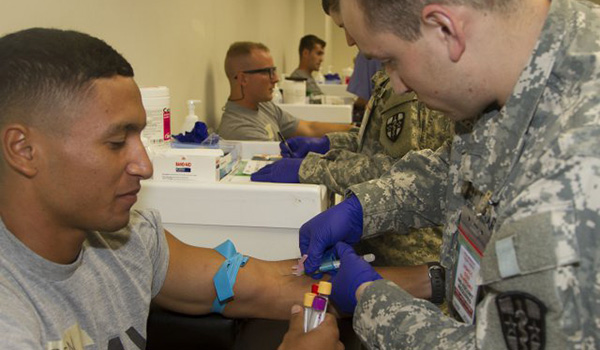
Ask the Flight Surgeon / By MAJ Eric Abdul, M.D.: Q: I just went through a long process to get a waiver for anemia during my first flight physical. I didn’t know I had it, and it doesn’t affect me. I had to see an Internal Medicine doctor and they ran a lot of tests, but didn’t find anything wrong. What happens next year if they test me and my numbers are the same? Do I have to go through the whole process again? Is there anything I can do differently to prevent being anemic in the first place?

Photo by Spc. James Bradford, public affairs specialist, 372nd Mobile Public Affairs Detachment, army.mil
FS: Anemia is a common diagnosis we evaluate. Let’s start with why we are concerned with this condition, even though, as in your case, most patients have no noticeable symptoms.
There are two reasons we are concerned about your initial lab results, though you have no symptoms. First, the aviation environment puts additional stress on the oxygen carrying capacity of your blood. Second, your anemia may be caused by an additional underlying condition that may need further evaluation.
If you are an aviator in an unpressurized aircraft, a decrease in oxygen carrying capacity that is not noticeable on the ground can become symptomatic at oxygen deficient altitudes where rotary wing aircraft operate. As you climb, even at 5,000 feet above sea level, the decrease in oxygen in the atmosphere can result in a symptomatic decrease in oxygen in your blood even for those who are not anemic. For aviators with anemia, the effects of hypoxia (i.e. decreased oxygen delivery to your body) may show up faster than usual, more vigorously and/or at lower altitudes than your peers.
Causes
Anemia is most often a decrease in the total number of the red blood cells that deliver oxygen to your tissues. However, any decrease in your blood’s ability to deliver oxygen is a form of anemia. Other potential causes include low levels of hemoglobin, the oxygen carrying molecule in the red blood cells, or a decrease in the effectiveness of that hemoglobin. The Army has standard bloodwork values for new aviators such as hemoglobin concentration and hematocrit (the percentage of blood volume that is made up of red blood cells). Most people who are anemic are not very far below these standard cutoff numbers and waiver is likely. However, a significant deficiency may involve a more complex evaluation while waiting to return to flight.
Addressing underlying conditions that may produce anemia, there are three general processes: producing less hemoglobin, increased blood loss, or early destruction of red blood cells (they typically last for 120 days on average). Within these categories, there are a number of causes, including some that are potentially serious and can cause a symptomatic, progressive, continual worsening of your anemia. The battery of required tests lets the flight surgeon make a reasonable determination if one of those more concerning conditions may be present. It is not uncommon, like in your case, that further testing does not detect a secondary medical concern with many people having a lower than average, but stable, hemoglobin and hematocrit levels.
What to Do
You asked if there was anything you could do about your anemia. Please know that in your case, it is unlikely that you did something to cause your mild anemia. With testing not finding any particular concerns or evidence of some correctable disorder, maintain a healthy lifestyle with sufficient exercise and proper diet. Also you may want to limit drinking alcohol as it can interfere with blood production and avoid smoking tobacco as it reduces your blood’s ability to carry and deliver oxygen. Those with underlying conditions, such as an inadequate intake of iron or vitamin B12, heavy menstruation, an autoimmune disease, etc. will need additional medical guidance to address their particular concerns.
The good news is that next year you are likely to continue to meet waiver requirements without the need to repeat the initial waiver process as long as you are symptom free and your yearly bloodwork remains at stable levels with no concerning findings. However, if you start to have symptoms, such as feeling fatigued, shortness of breath or if your lab results worsen, you will need to see your flight surgeon or aeromedical physician assistant for further evaluation.
Thank you for your questions. Stay safe! Dr. Abdul
Question for the Flight Surgeon?
If you have a question you would like addressed, email it to This email address is being protected from spambots. You need JavaScript enabled to view it.; we’ll try to address it in the future. See your unit flight surgeon for your personal health issues. The views and opinions offered are those of the author and researchers and should not be construed as an official Department of the Army position unless otherwise stated.
MAJ (Dr.) Eric Abdul is a flight surgeon at the U.S. Army School of Aviation Medicine, Fort Rucker, AL.
























